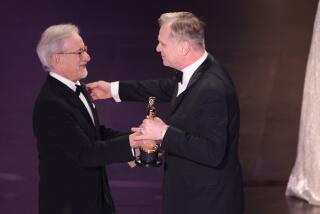Spirit Awards buck the Oscars as ‘If Beale Street Could Talk’ wins top prizes
Reclaiming some of the upstart energy that sets them apart from the weekend’s other big Hollywood kudos, the Spirit Awards put on an irreverent yet sincere celebration of independent films on Saturday.
The Spirits gave the top prize for best feature to “If Beale Street Could Talk,” directed by Barry Jenkins, who also won best director. Actress Regina King took best supporting female.
Four out of five of recent Spirit Award winners have gone on to win the Oscar for best picture. This year, for the first time since 2008, none of the movies nominated for the top prize at the Spirit Awards are in contention for the best picture Oscar.
While a handful of Oscar nominees — including King and best female lead honoree Glenn Close of “The Wife” — did indeed win, Spirit Awards voters seemed intent this year on largely going their own way.
The show, which takes place in a tent near the ocean in Santa Monica, was hosted by actress and producer Aubrey Plaza, who set the tone with an opening video of herself leading actresses Marcia Gay Harden, Sharon Stone, Marisa Tomei, Rosanna Arquette and Christina Ricci as a coven of witches pledging themselves to independent cinema.
In her opening monologue, Plaza drew a connection with Sunday’s host-less Oscars by saying, “The network’s first choice was no one, but they were already booked for tomorrow, so you got me.”
The power of women became a running theme throughout the afternoon. Three of the five nominees for best director were women, and two of the five films nominated for best film had women at the helm. None of this year’s best picture nominees at the Oscars were directed by women, and none of the nominees for best director were women, either.
In accepting the directing prize, Jenkins noted that while women make up 4% of directors of studio films, they accounted for more than 40% of directors in competition this year at Sundance and 60% of directors in the category he had just won.
Jenkins encouraged all of those in the room to commit to working with a female director in the next 18 months so that, “the 4% will become the 8% will become the 12% will become the 16%.” This was met with a rousing ovation from the crowd.
He also thanked his female collaborators on “Beale Street,” who taught him “to check my directorial ego and learn I could not make a movie about women without women’s voices in the forefront.”
In a category that had zero overlap with this year’s Oscar nominees, Ethan Hawke won best male lead for his role in Paul Schrader’s “First Reformed.” Hawke, who was not at the ceremony as he is appearing on Broadway in “True West,” sent a note quoting the monk Thomas Merton, which was read by his “First Reformed” co-star Amanda Seyfried.
Oscar nominee Richard E. Grant won supporting male for his performance in “Can You Ever Forgive Me?” Among those he thanked in his speech were the actors Sam Rockwell and Chris O’Dowd, who had both been cast in the role but fell out.
Best documentary went to Morgan Neville’s “Won’t You Be My Neighbor?,” a box office hit about the children’s TV host Fred Rogers that was a surprise omission from this year’s Academy Awards. The award for international film went to Alfonso Cuáron’s Oscar favorite “Roma.”
In accepting the award Cuáron said, “I’m optimistic right not that we’re reaching a moment of greater diversity in cinema.”
The Spirit Awards give out numerous prizes that are unique to the show. The winner of the first feature award was Boots Riley for the Oakland-set “Sorry To Bother You.”
In accepting the award, Riley spoke about class struggle, adding: “People are trying to change the way the world is. And rightfully so, film is responding to that.” He then called out the CIA for its actions in Venezuela, saying, “We should all be putting our voices out to stop the U.S. from having regime change for oil in Venezuela.”
The first screenplay award went to Bo Burnham for “Eighth Grade.” The John Cassavetes prize for a film made for under $500,000 went to Jim McKay’s “En El Séptimo Día.”
The Robert Altman award — given to a director, casting director and ensemble cast — went to Luca Guadagnino’s remake of “Suspiria,” starring Dakota Johnson, Tilda Swinton, Chloë Grace Moretz and Mia Goth.
In accepting the prize, casting director Stella Savino said, “As a casting director, I cannot imagine anything more exciting than casting so many female roles to play.” She called the movie and its depiction of witchcraft “a great metaphor for women’s power.”
Four awards with cash prizes were also announced at a recent luncheon. “Leave No Trace” filmmaker Debra Granik won the second Bonnie Award, named for Bonnie Tiburzi Caputo, the first female commercial airline pilot, which comes with a $50,000 grant.
The Someone to Watch award went to Alex Moratto, the Producers Award went to Shrihari Sathe, and the Truer Than Fiction award went to Bing Liu. All three come with a $25,000 cash grant.
Additional awards went to Nicole Holofcener and Jeff Whitty for the screenplay of “Can You Ever Forgive Me?,” Joe Bini for editing “You Were Never Really Here” and cinematographer Sayombhu Mukdeeprom for “Suspiria.”
Mukdeeprom was in Greece shooting another project. In accepting the prize for him, “Suspiria” casting director Savino again took the stage to read a note from Mukdeeprom that said, “My spirit is very independent, and that’s why I am not there.”
SIGN UP for the free Indie Focus movies newsletter »
Follow on Twitter: @IndieFocus
More to Read
Only good movies
Get the Indie Focus newsletter, Mark Olsen's weekly guide to the world of cinema.
You may occasionally receive promotional content from the Los Angeles Times.












